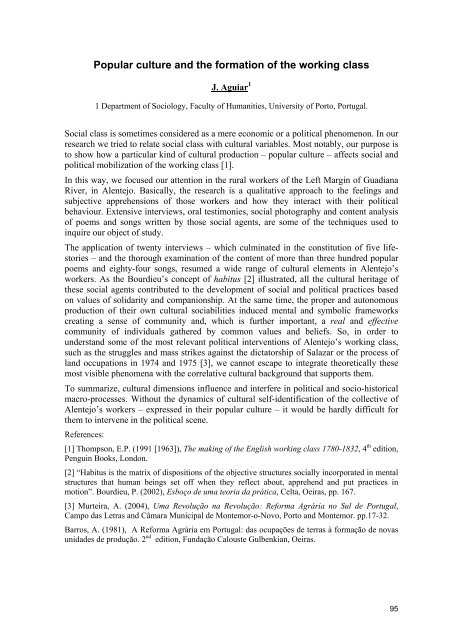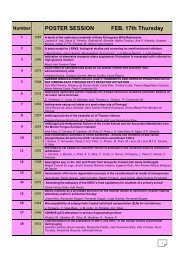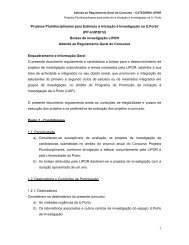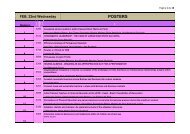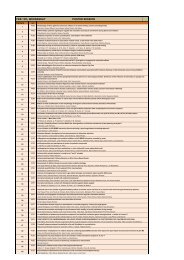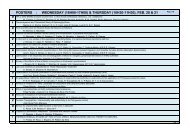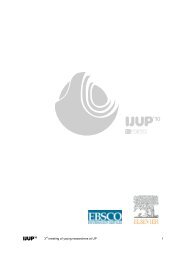IJUP08 - Universidade do Porto
IJUP08 - Universidade do Porto
IJUP08 - Universidade do Porto
- TAGS
- universidade
- porto
- ijup.up.pt
You also want an ePaper? Increase the reach of your titles
YUMPU automatically turns print PDFs into web optimized ePapers that Google loves.
Popular culture and the formation of the working class<br />
J. Aguiar 1<br />
1 Department of Sociology, Faculty of Humanities, University of <strong>Porto</strong>, Portugal.<br />
Social class is sometimes considered as a mere economic or a political phenomenon. In our<br />
research we tried to relate social class with cultural variables. Most notably, our purpose is<br />
to show how a particular kind of cultural production – popular culture – affects social and<br />
political mobilization of the working class [1].<br />
In this way, we focused our attention in the rural workers of the Left Margin of Guadiana<br />
River, in Alentejo. Basically, the research is a qualitative approach to the feelings and<br />
subjective apprehensions of those workers and how they interact with their political<br />
behaviour. Extensive interviews, oral testimonies, social photography and content analysis<br />
of poems and songs written by those social agents, are some of the techniques used to<br />
inquire our object of study.<br />
The application of twenty interviews – which culminated in the constitution of five lifestories<br />
– and the thorough examination of the content of more than three hundred popular<br />
poems and eighty-four songs, resumed a wide range of cultural elements in Alentejo’s<br />
workers. As the Bourdieu’s concept of habitus [2] illustrated, all the cultural heritage of<br />
these social agents contributed to the development of social and political practices based<br />
on values of solidarity and companionship. At the same time, the proper and autonomous<br />
production of their own cultural sociabilities induced mental and symbolic frameworks<br />
creating a sense of community and, which is further important, a real and effective<br />
community of individuals gathered by common values and beliefs. So, in order to<br />
understand some of the most relevant political interventions of Alentejo’s working class,<br />
such as the struggles and mass strikes against the dictatorship of Salazar or the process of<br />
land occupations in 1974 and 1975 [3], we cannot escape to integrate theoretically these<br />
most visible phenomena with the correlative cultural background that supports them.<br />
To summarize, cultural dimensions influence and interfere in political and socio-historical<br />
macro-processes. Without the dynamics of cultural self-identification of the collective of<br />
Alentejo’s workers – expressed in their popular culture – it would be hardly difficult for<br />
them to intervene in the political scene.<br />
References:<br />
[1] Thompson, E.P. (1991 [1963]), The making of the English working class 1780-1832, 4 th edition,<br />
Penguin Books, Lon<strong>do</strong>n.<br />
[2] “Habitus is the matrix of dispositions of the objective structures socially incorporated in mental<br />
structures that human beings set off when they reflect about, apprehend and put practices in<br />
motion”. Bourdieu, P. (2002), Esboço de uma teoria da prática, Celta, Oeiras, pp. 167.<br />
[3] Murteira, A. (2004), Uma Revolução na Revolução: Reforma Agrária no Sul de Portugal,<br />
Campo das Letras and Câmara Municipal de Montemor-o-Novo, <strong>Porto</strong> and Montemor. pp.17-32.<br />
Barros, A. (1981), A Reforma Agrária em Portugal: das ocupações de terras à formação de novas<br />
unidades de produção. 2 nd edition, Fundação Calouste Gulbenkian, Oeiras.<br />
95


